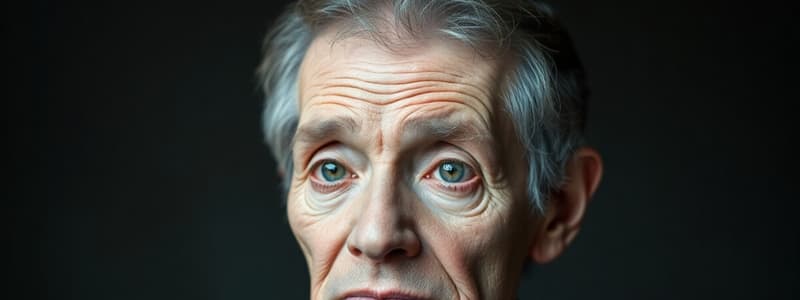Podcast
Questions and Answers
Which type of age is primarily determined by the functioning of an individual’s organs?
Which type of age is primarily determined by the functioning of an individual’s organs?
- Biological age (correct)
- Sociocultural age
- Psychological age
- Chronological age
What best describes sociocultural age?
What best describes sociocultural age?
- The cognitive abilities of an individual
- The emotional stability based on past experiences
- The actual number of years a person has lived
- Expectations about life events in a specific culture (correct)
Which of the following is NOT a type of ageing described?
Which of the following is NOT a type of ageing described?
- Tertiary ageing
- Primary ageing
- Quantitative ageing (correct)
- Secondary ageing
What influences life-cycle forces according to developmental psychology?
What influences life-cycle forces according to developmental psychology?
Which ageing process involves normal and disease-free development?
Which ageing process involves normal and disease-free development?
What is an example of secondary ageing?
What is an example of secondary ageing?
What is characterized by rapid losses shortly before death?
What is characterized by rapid losses shortly before death?
Which component is NOT included in the psychological forces influencing ageing?
Which component is NOT included in the psychological forces influencing ageing?
How would normative history-graded factors be best described?
How would normative history-graded factors be best described?
Which age concept is defined by how old a person believes they are?
Which age concept is defined by how old a person believes they are?
What does the concept of nature-nurture primarily examine?
What does the concept of nature-nurture primarily examine?
Which statement best characterizes the concept of stability-change in development?
Which statement best characterizes the concept of stability-change in development?
What does continuity-discontinuity primarily focus on in development?
What does continuity-discontinuity primarily focus on in development?
In the context of adult development, what does the term 'plasticity' refer to?
In the context of adult development, what does the term 'plasticity' refer to?
Which of the following best describes the difference between 'good' and 'bad' aging?
Which of the following best describes the difference between 'good' and 'bad' aging?
Which of the following statements best captures the idea of universal versus context-specific development?
Which of the following statements best captures the idea of universal versus context-specific development?
What are the primary concerns regarding neurobiological plasticity?
What are the primary concerns regarding neurobiological plasticity?
Which of the following concepts represents a qualitative change in development?
Which of the following concepts represents a qualitative change in development?
What key force is least likely to shape individual development?
What key force is least likely to shape individual development?
Study Notes
Conceptualizing Age
- Age can be defined through multiple lenses: chronological, biological, perceived, psychological, and sociocultural.
- Chronological age refers to the actual time a person has lived, while biological age assesses functional organ capacity.
- Perceived age reflects an individual's self-assessment of their age, which can differ from chronological age.
- Psychological age indicates functioning in areas such as memory, intelligence, and emotions.
- Sociocultural age is shaped by societal expectations surrounding major life events.
Types of Ageing
- Primary ageing entails natural maturation without disease or disability.
- Secondary ageing includes changes linked to health issues, lifestyle, and environmental factors, which are not inevitable.
- Tertiary ageing signifies rapid declines in health and functionality preceding death.
Forces Influencing Ageing
- Ageing is influenced by four primary forces:
- Biological forces: genetic inheritance and health-related aspects.
- Psychological forces: cognitive, emotional, and personality traits.
- Sociocultural forces: impact of culture, society, and interpersonal relationships.
- Life-cycle forces: variations in the effect of events across different life stages.
Lifecycle Forces
- Normative age-graded factors: common experiences linked to specific ages shaped by biological, psychological, and sociocultural elements.
- Normative history-graded factors: shared events that affect individuals within a specific cultural or temporal context.
- Non-normative factors: unique or rare events impacting individuals, not shared widely.
Core Issues in Development
- Nature-nurture debate involves genetic versus environmental determinants of personality.
- Stability-change focuses on the extent of personal constancy over time, acknowledging both gains and losses.
- Plasticity covers potential for change, encompassing neurobiological, behavioral, and societal aspects.
- Continuity-discontinuity addresses whether development is a gradual process or marked by abrupt shifts.
- Universal versus context-specific considers if there are general pathways or diverse patterns of development.
Understanding Positive Ageing
- Positive ageing emphasizes the avoidance of disease and disability, maintaining effective functioning, and sustaining social engagement.
- It promotes resilience, fulfillment, and control while embracing the normal progression of aging.
- The positive ageing movement encourages constructive perceptions of growing older as part of continuous human development.
Summary of Key Questions
- Importance of studying adult development and ageing highlighted.
- Characteristics of older adult population in Australia and future demographic trends discussed.
- Different conceptualizations of age elaborated.
- Four main forces shaping development identified.
- Three key influences on ageing and development outlined.
- Theoretical issues in ageing and development categorized.
Studying That Suits You
Use AI to generate personalized quizzes and flashcards to suit your learning preferences.
Related Documents
Description
Explore the various conceptualizations of age in this quiz. Delve into chronological, biological, psychological, and sociocultural definitions to understand how age is perceived and measured. Join us to challenge your understanding of how we define age.



